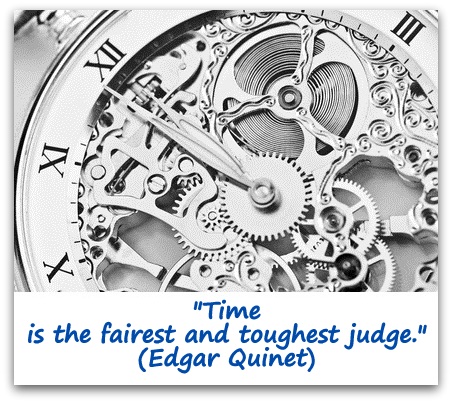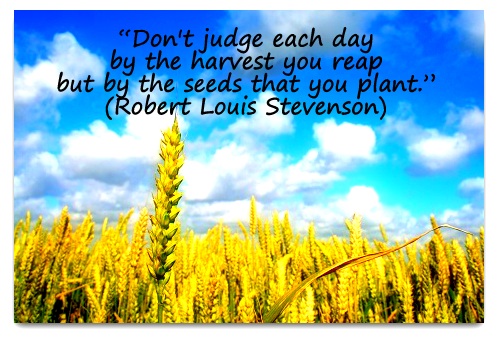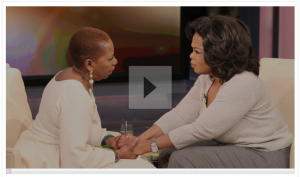Coaching Quote of the Day 17th April 2015

“Time is the fairest and toughest judge.”
(Edgar Quinet)

“Time is the fairest and toughest judge.”
(Edgar Quinet)

“Don’t judge each day by the harvest you reap but by the seeds that you plant.”
(Robert Louis Stevenson)
“If you judge people, you have no time to love them.”
(Mother Teresa)
In today’s guest post coach Anja Schuetz shares her expertise and thoughts on loving communication.
The Dutch TV aired a re-run of an Oprah episode the other day, where Iyanla Vanzant returns to the show after 11 years. Oprah and her had parted ways 11 years ago after a “betrayal” and this was the first time they saw each other again. As viewers we became witness to a conversation in which they may or may not make up.
I loved how Iyanla set the tone by starting the conversation with a sincere, heartfelt apology:

“I love you. I have always loved you and had nothing but positive regard for you. And I am now so sorry. I am aware of how my behavior and my choices could have appeared to you and been experienced by you as betrayal. Please forgive me. Please! That was not my intention. Ever.”
Notice how she takes Oprah’s hands and keeps eye contact as she apologizes. Even though the conversation gets a little heated later on – this strong acknowledgment from both sides in the very beginning set the right intention for both parties and allowed them to keep coming back to a common ground – compassionately and even humorous at times.
It is evident that both party’s intention is to understand each other’s behaviors, reasonings and intentions during that conflict eleven years ago and then MOVE ON from there, while re-newing their relationship.
It is fascinating to watch their language, which doesn’t contain any blame or negative energy. Rather than “But you said…!” they phrase their statements like this “What I heard you saying/What I thought you were saying, is…” Can you hear the difference? It says, ”I’m not holding you responsible for how I feld about what I heard.” As opposed to “You made me feel bad!” It creates an open space. It allows the sender of the message to see how their words arrived on the other side. It bypasses their ego and wins over the desire to be right.
We all live in our own reality. We all judge situations by the way we see them; by the way we see the world. However how we see the world is colored by how we see ourselves. And how we see ourselves is coloured by our past experiences and the beliefs and rules we have made up for ourselves.
This becomes so very clear in the second part of the following small clip, where Iyanla says, “You never told me you liked me!” and Oprah is flabbergasted how Iyanla could have possibly missed how much she liked her (through the actions and behavior she showed to Iyanla).
While this is clear evidence of Oprah and Iyanla speaking different love languages it becomes also clear that Iyanla wouldn’t have “heard” it no matter what language Oprah had spoken. Because she didn’t feel she deserved it. Because according to her own made-up rules, she felt she hadn’t worked hard enough for this yet.
The fame and the opportunities came too early in her perception. That’s why she couldn’t allow herself to receive. Watch how important it is to her to be heard by Oprah, who at first really doesn’t get it, because she doesn’t live by the same limiting rules.
We never know what’s going on in the other person. We never have the full story. We never truly know their feelings and fears, which might have influenced their behavior. Yet we constantly guess and then take our guesses for the truth.
Every behavior follows a positive intention. We make decisions and behave according to what makes sense to us at the time. However this doesn’t always make sense to other people.
If someone behaves strangely in our eyes, most of us make up a story that fits our image of the world, as to why they are behaving that way. Rather than entering a clarifying conversation, we label them “stupid” and we might even read their minds and tell other people “He thinks he is the king of the world!!” We constantly interpret behaviors and attach meanings to them that make sense to us.
Rather than judging people’s behavior, let’s try and focus on their intention instead. The only way to find out the other person’s intention is to ask them. Open a dialogue and ask, “What was your intention, when you did that?”
Can you hear the difference to “Why did you do that??”
The word “why?” forces the other person into defensive mode and asks for justification of past behavior. It’s a very loaded question and can come across in itself as a judgment. Just imagine someone saying it to you, including the hidden second part of the question, “Why did you do that, you [adjective] [noun]??” 🙂
“What was your intention?” is pretty much the same question, however it sounds a lot less loaded and it’s constructive. It keeps you both looking forward; it keeps you focused on a solution, not on blame and as you agree that the intention was good, you only need to find a better method (=behavior) together on how to follow through on that positive intention.
There are always two goals in any situation: One is to achieve a certain outcome, the other is to maintain our relationships with the people involved.
This is the whole meaning of the quote “Nobody can win an argument.”
As important as it is to focus on our own intentions to achieve our goals in life, as important it is to focus on other people’s intentions before we judge them.
Or better yet… INSTEAD of judging them.
About the Author/Further Resources
Anja Schuetz is a Recognition Professional and Coach. By day she works with managers to use more loving communication in the workplace and by night she coaches women through uncertainty to confidence.
She is also the author of the People Management Coaching Cards at www.selfcoachingcards.eu.
Find out more about Anja at www.anjaschuetz.net or connect with her on Facebook.com/virtualanja or Twitter @virtualanja.
“Believe only what you yourself test and judge to be true.”
(Budha)
Before setting up my own coaching practice full time I was employed in the training and development team of a multi-national company. One of the departments I particularly loved working with was the contact centre – the very nature of the work of a contact centre involves a lot of communication with people over the phone.
I spent many a happy hour developing the skills of individuals who spent the majority of their working lives having conversations over the phone.
I once ran a workshop that had a mix of individuals who had a background working via a phone and those who generally worked face-to-face. I knew the work of all of those in the room and knew that they were all fantastic listeners.
As part of the workshop I included an exercise about listening – the whole group excelled at the first part. The difference came when I asked that they did the same exercise with their eyes shut. What quickly became apparent was that those who had lots of experience working via the phone found the task relatively easy. Those who mainly worked face-to-face struggled without the visual cues they were used to working with.
Now I’m not for one minute suggesting that those who normally worked face-to-face with people “failed” and therefore are consigned to never communicating using any other method ever again! What I am saying is that listening without being able to literally physically see what’s going on is a skill that can be developed like any other. It’s something that, with practice can get stronger and stronger.
So why am I writing about contact centres on a Wednesday coaching post?
You’ll often find coaches discussing the importance of listening when having a coaching conversation. Pretty much up until running that workshop I didn’t fully get why when I met other coaches at events so many of them would give me a strange look when I said I coached via the phone.
I do a lot of my work via the phone – it’s a medium I’m comfortable with. I like the extra benefits it can bring, such as being able to work with wherever my ideal clients are (providing they have a working phone signal). I don’t have to have geographic limitations so that we can both be physically in the same place.
It also makes scheduling clients a lot easier – there are no travelling times to take into consideration. So I have far more flexibility with my phone coaching sessions than I often have with a face-to-face session. I don’t know about you, but even though I often quite like a car or train journey I much prefer the joy I get from coaching. I’d much rather be spending my time running a coaching session than travelling to one.
There are many other reasons why I personally choose to mainly coach via the phone. Thinking back to the many different trainings I have attended there have been many, many skills and techniques that I have at my fingertips from those events to use when coaching via the phone.
However, I recall only a handful of occasions when someone has specifically discussed coaching using the phone – normally in response to a delegate’s question. I can also recall few training drills and exercises where we were strengthening our listening skills without the visual cues.
So, to answer the question in the title of this post, it is possible to listen without having visual cues. One of the main questions I get asked by coaches who don’t coach via the phone is how do you do that if you can’t see what someone is doing or thinking?
There are several things you can do to make coaching via the phone easier and skills you can develop and strengthen so that, if you want, you can transfer your own coaching style to work via the phone.
I love the variety and breadth that is found in the coaching profession, and there will be some coaches who choose to coach face to face. Perhaps it’s because it’s a medium they really enjoy or maybe they coach in a way that is really much easier face to face (ie as a kids sports coach). So please don’t misunderstand my post as an implication that all coaches should be coaching via the phone.
However, you may have ruled out working via the phone because you don’t know where to start or have no idea how you could coach without literally physically seeing when a client is thinking etc. I’ve seen some jump to the conclusion that they just couldn’t coach that way, that somehow they would never be “good enough.” If that sounds like you, please remember that:
(a) Knowledge can be learnt
(b) You can strengthen skills with practice
(c) How do you know if you haven’t had the experience?
I have decided to put on a training to assist those who are interested in starting phone coaching. It’s a training where I’m pulling together all my coaching and working on the phones knowledge and experience to give a very practical course. Designed to put your learning into context I want you to complete the course having successfully coached others via the phone, building up experience and feedback.
It’s a training that will take place over the phone, using technology that allows you to work in small groups within the call, exactly as you could during a live face-to-face training – you will be strengthening those skills you will use when phone coaching all the way through the course. For more details click here.
It’s possible that the scenario that you are coaching in is likely to partly influence the focus and perspective of how you judge a specific coaching session.
If you are coaching where you are developing and practicing a specific ability in a training environment then perhaps you will use how you performed a specific technique, coaching model or skill as a way to judge.
If you are coaching in a business context as an internal member of a team then perhaps the judgement about how well a coaching session is influenced by other aspects of the expectations of your job role.
If you are coaching in a business context as an external provider then you may have other influences about how you judge a session was a good one.
Broadly speaking there are 5 different scenarios you may find yourself coaching:
For the purposes of this list by formal I mean a session where both you and the person you are having a coaching conversation with are aware that you are coaching.
By “informal” I mean a situation where the other person may describe it as a chat at lunch, or an interesting conversation in the corridor etc. – As a coach you may have been very aware that you were having a conversation that would easily be identical in a formal coaching session. It’s just not necessarily the label the other person would use.
The question I ask today is as a coach, how are you judging you are doing a good job? I appreciate that potentially the scenario and context you are coaching in may influence your judgement.
Do you form a judgement given what you have personally seen or heard? Perhaps you just get a specific feeling that tells you that you’ve done a good job.
Maybe you let your client(s) be the guide about if it was a good session and use the feedback from those directly involved.
Another aspect that some people use to judge is criteria either given directly to you by someone other than your client (ie a trainer/organisation). Alternatively, you can judge using a comparison with someone else.
You may have noticed that I specifically used the word judging, as in “to form an opinion about,” in my question.
Each method of judging can have an impact on how confident you feel about your coaching and the action that you take which can positively or negatively impact your business.
As always, if you are judging if you are doing a good job, and that way is working for you then do keep doing what you are doing. If it isn’t working you may want to consider how you are forming that judgement and what you are doing with that opinion.
Here are a few questions and observations that will apply more to some judgement methods than others:
Just for fun, if you were to consider the opposite to your judgement, what “evidence” could you find? If you were to use that judgement what would you do differently?
I’ll also mention that many people pick someone with years of experience and thousand of hours of practice to use as a comparison – hardly a fair comparison if you haven’t also got years of experience and thousands of hours practice as well!
If you haven’t already I invite you to consider how you are judging your coaching and the impact that is having.
“It took me a long time not to judge myself through someone else’s eyes.”